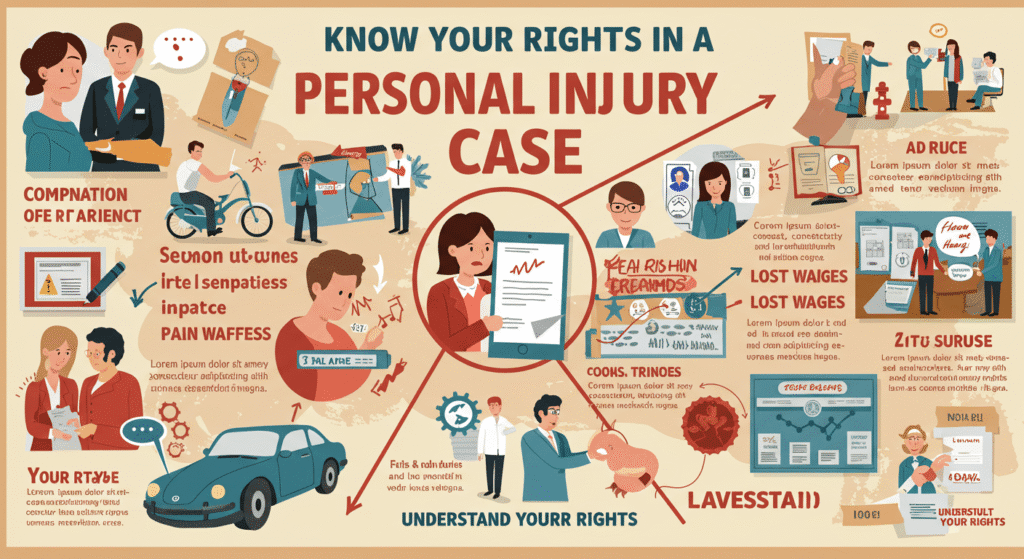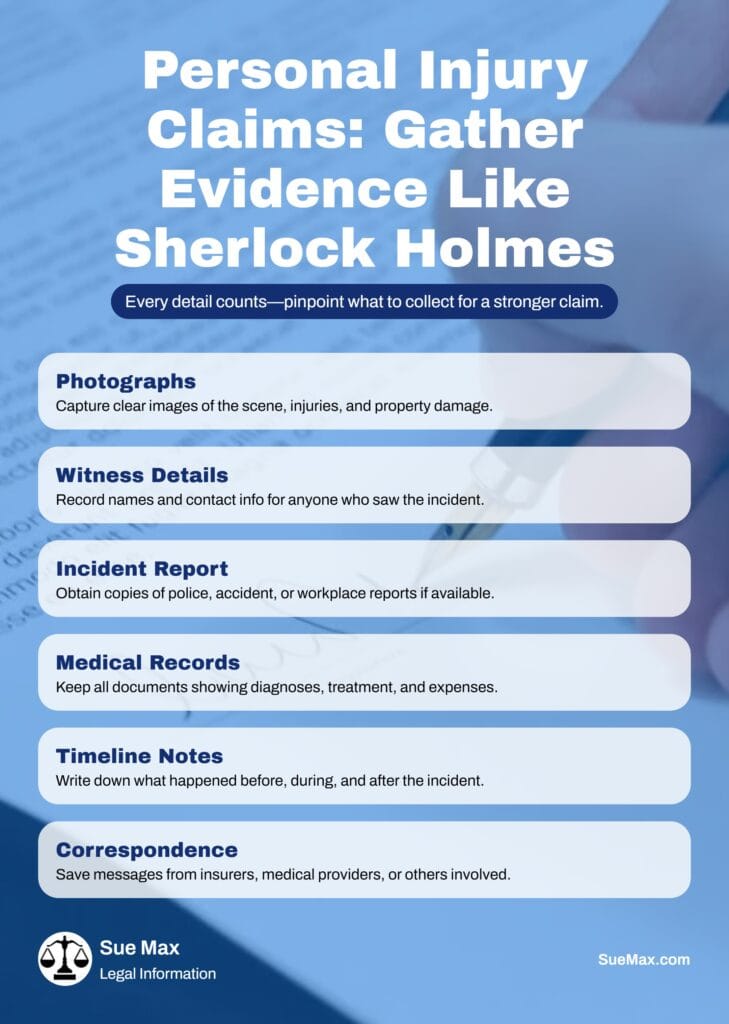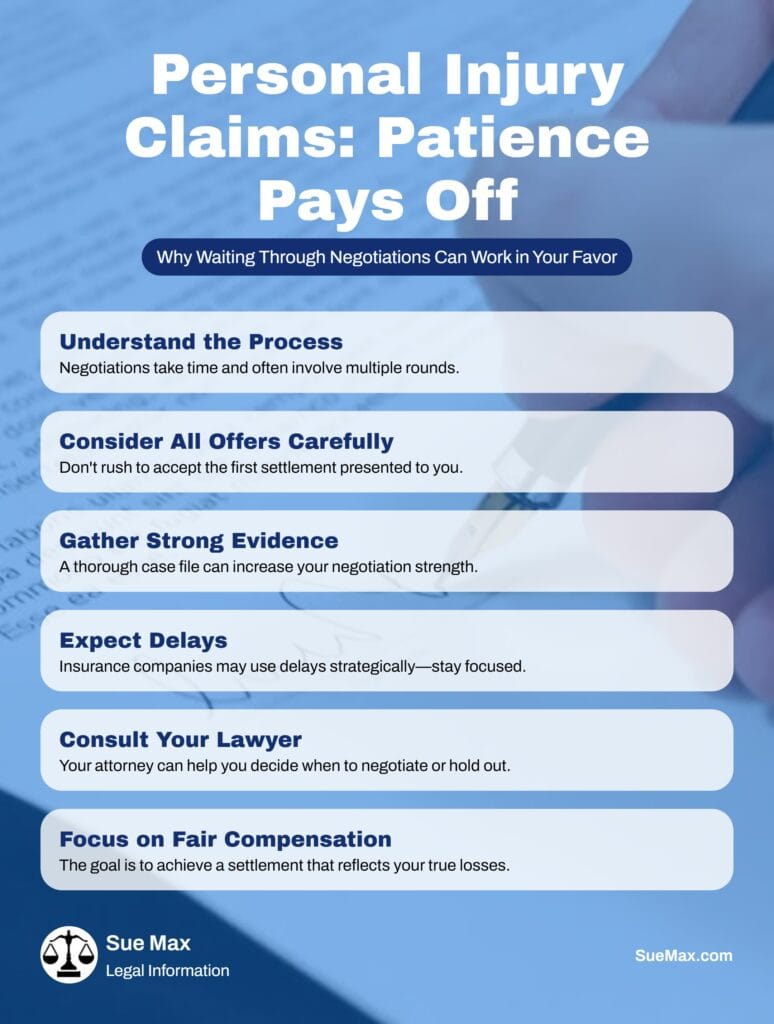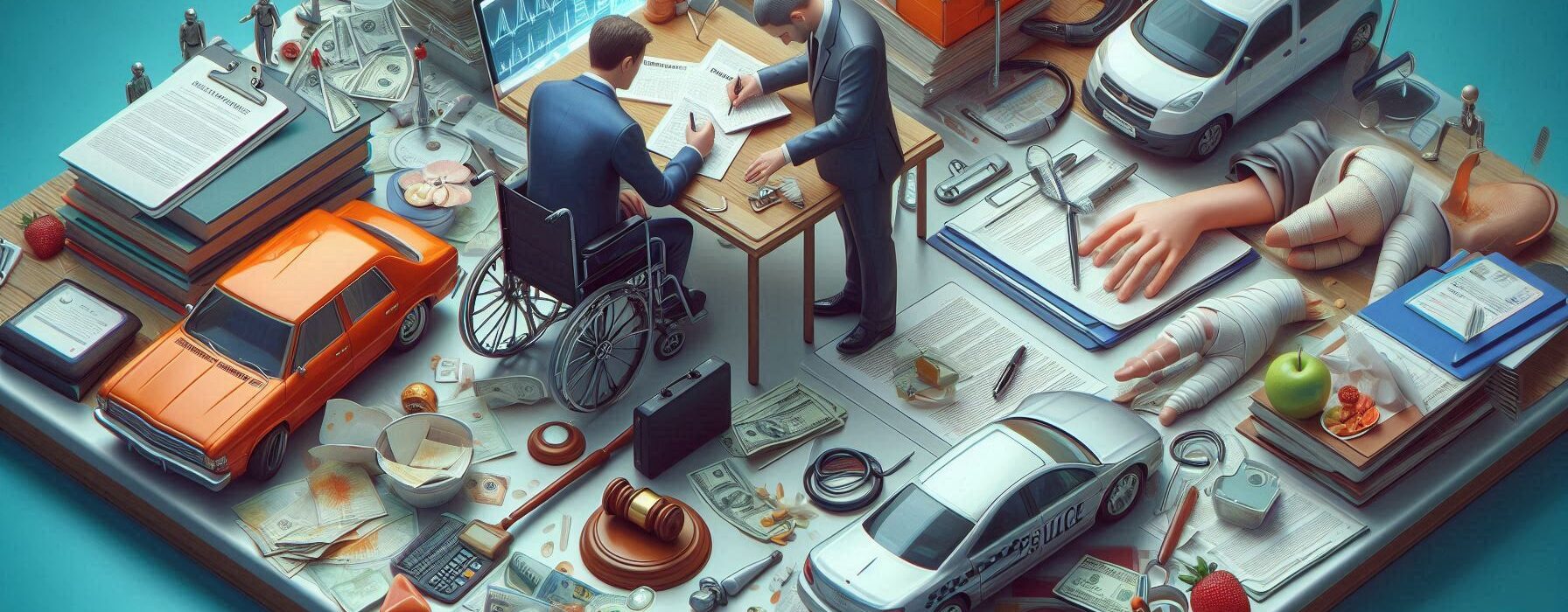Navigating the world of personal injury claims can feel like trying to find your way through a maze blindfolded. One minute you’re feeling confident, and the next, you’re wondering if you accidentally wandered into a circus instead of a legal office. Don’t worry; I’ve been there too! Let’s dive into some tips that will help make this process a little less daunting and maybe even a bit fun.
Top Takeaways and Key Concepts
Know your rights before acting. Research state laws or consult a personal injury attorney to understand your legal options.
Collect strong evidence early. Take photos, gather witness statements, and save all medical and expense records to strengthen your claim.
Choose a specialized attorney. Hire a lawyer experienced in personal injury cases who communicates clearly and prioritizes your needs.
Stay patient and composed during negotiations. Expect low initial offers, remain calm, and negotiate strategically for a fair settlement.
Stay organized from start to finish. Use color-coded folders or digital tools to track deadlines, documents, and communications efficiently.
Summary of This Article
This article offers a practical, lighthearted guide to navigating personal injury claims with confidence and clarity. It emphasizes understanding your rights as the foundation for any successful case, supported by solid evidence gathering and organized recordkeeping. Readers are encouraged to select an attorney who specializes in personal injury law and to stay patient throughout the negotiation process, resisting the urge to accept the first offer. The piece closes by stressing the importance of staying organized and knowing when to settle or continue fighting for fair compensation. Altogether, it empowers readers to approach the claims process strategically, confidently, and with a sense of control over the outcome.
Understand Your Rights

Please Note: This post may contain affiliate links. If you click one of them, we may receive a commission at no extra cost to you. As an Amazon Associate, I earn from qualifying purchases.
👓 In the U.S., there’s a legal term called “slip and fall,” which sounds like a dance move gone wrong. People can actually sue if they slip on a banana peel—yes, really! Just make sure you don’t go around tossing fruit to test this out! 👓
“Your rights are like a good sandwich: if you don’t know what’s in it, you might end up with something that doesn’t taste good.” – Unknown
First of all, do you know what your rights are? A lot of people are shocked to find out that they have more rights than they thought. It’s like finding an extra fry at the bottom of the bag: surprising yet great! Knowing your rights is very important because it is the basis for everything else in your claim.
Each state has its own rules in personal injury cases. Some regions may have severe deadlines for filing claims, while others may be more flexible. So, what do you need to do? First, conduct some study or talk to a lawyer who knows a lot about personal injury law. They’ll assist clear up any confusion faster than you can say “settlement check!”
Know Your Rights: A Fun Look at Personal Injury Claims
– The “Oops” Factor: Did you know that in some states, if you trip over your own feet and fall, you might not be able to sue anyone? It’s called “contributory negligence,” which sounds like a fancy term for “you should’ve watched where you were going!”
– Injury by Hot Coffee: The infamous McDonald’s hot coffee case wasn’t just about spilled coffee; it was also about the fact that the coffee was served at a temperature of 190°F! That’s hotter than a volcano—perfect for brewing but not so great for your lap.
– The Sneaky Statute of Limitations: Most personal injury claims have a time limit, usually between one to three years. So, if you think about suing someone for that time you got stuck in an elevator with your ex, make sure you act fast—or you’ll miss your chance and be stuck with those memories forever!
Once you know what your rights are, you’ll be able to speak out for yourself during talks. This information is like having superpowers; you’ll be able to tell when someone is trying to trick you! Picture yourself stepping into a negotiation room with the confidence of a superhero who is ready to save the day. You’ll be able to see through the devious tricks that insurance firms often use, such making lowball offers or giving you imprecise explanations to confuse you.
When you feel empowered, you’re not just sitting back and wishing for the best; you’re also taking part in conversations about your claim. It’s like getting a hidden decoder ring that tells you what all those legal words and phrases truly mean. It’s simpler to ask direct questions and get straightforward answers when you know what your rights are. For example, if an adjuster tries to downplay your injuries or tell you to settle quickly without getting the right amount of money, you’ll be able to use facts to back up your case.
This new information enables you compete with the big insurance firms on an equal footing. They may have teams of lawyers and adjusters working behind the scenes, but if you know your rights and what you’re entitled to, you don’t have to worry about them anymore. You won’t be scared by their techniques or industry jargon; instead, you’ll be sure of what’s fair and reasonable for your position.

And let’s not forget how good it feels to be able to say what you need clearly! Instead of muttering through talks or accepting whatever scraps are thrown your way, you’ll firmly make your case with proof and sound logic. People tend to pay attention when someone realizes their worth, therefore this boldness can lead to better results.
Take that feeling of strength and run with it! Every time you learn anything new about personal injury legislation and your own situation, you make yourself a better advocate in these talks. Keep in mind that information is power, and in this case, it could mean the difference between getting what you really deserve and not getting it.
Gather Evidence Like Sherlock Holmes

👓 In 2015, a man in the U.K. tried to claim personal injury after slipping on a wet floor at a supermarket, but his case was dismissed when it turned out he had been doing the “moonwalk” dance move right before falling! Talk about evidence working against you! 👓
“Life is like riding a bicycle. To keep your balance, you must keep moving.” – Albert Einstein
When it comes to claims for personal injury, evidence is the most important thing. Imagine that you are Sherlock Holmes, carefully putting together clues to make your case. Your claim will be stronger the more proof you have.
You’ll need to get medical records, photos of the accident scene (if you can), witness statements, and any other papers that might be useful. Instead of pretty stickers and glitter pens, you’re using police records and hospital bills to make an incredible scrapbook.
Become a Detective: Evidence Gathering for Personal Injury Claims
– The Power of Photos: Did you know that taking pictures right after an accident can be more helpful than a superhero? A snapshot of the scene can show exactly what happened, proving your case faster than you can say “cheese!”
– Witnesses Are Gold: If you find someone who saw your accident, they’re like finding a rare Pokémon! Their statements can make or break your claim, so don’t hesitate to ask them for their contact info—just don’t ask them to battle!
– Documentation Domination: Keeping track of all your medical bills and treatment records is like collecting baseball cards. The more you have, the better your chances are of scoring big when it’s time to negotiate! Plus, it’s hard to argue with a stack of evidence taller than your coffee table.
If you keep things in order, you won’t have to deal with chaos afterward. It’s like trying to find your way through a maze without a plan if you go into the realm of personal injury claims. A well-organized folder (either physical or digital) with the words “Evidence Collection” on it might also wow your friends at parties. After all, who doesn’t love a good yarn about their legal problems? Imagine this: you’re at a party, and someone asks you what you’ve been doing lately. You don’t just mumble about binge-watching shows on Netflix; you whip out your well-organized folder and start talking about how you handled an insurance claim like an expert!
Let’s speak about what’s in this wonderful folder now. First, get all the important papers that tell your tale. This includes police reports, medical records, pictures of the accident scene, and any letters or emails you sent to insurance firms. Not only can keeping these things organized in one location help when it’s time to bargain, it also makes you feel more in charge of your situation. It’s like having a superhero utility belt full with tools that are ready to use. Everything you need is right there!
Think about putting your evidence into groups so that you can easily find it. You might have sections for medical bills, statements from witnesses, and even notes from conversations with professionals who are working on your case. Each part is like a short story that fits into the bigger story of your claim. When it’s time to present your case or talk to a lawyer, you’ll be able to pull up the material you need faster than you can say “settlement.” Believe me, being ready is the best feeling.

This group isn’t just useful; it may also help you feel better when you’re stressed. Let’s be honest: dealing with personal injury claims can be too much. But knowing that everything is in order makes you feel a lot less anxious. Instead of saying “Oh no!” you’ll say something like “I’ve got this!” Where did I place that paper?
And if we’re talking about impressing friends at parties again (because why not?), think about how interesting it is to tell stories that are backed up by real data! Your stories will grow from vague anecdotes to thorough narratives with pictures and proof that show how hard you fought for what was properly yours.
Learn how to organize! Keeping everything in order will help you in more ways than one, whether you’re using a physical binder with colorful tabs or a sleek digital file system that would make Marie Kondo pleased. And who knows? You might be the star of the party while also standing up for yourself like a pro!
Choose the Right Attorney

👓 In 2018, a man in Florida hired an attorney who specialized in personal injury claims after he slipped on a banana peel—yes, really! The case became a local sensation, proving that sometimes the best way to choose the right attorney is to find one who appreciates the absurdity of life. 👓
“Success is not how high you have climbed, but how you make a positive difference to the world.” – Roy T. Bennett
Now things get interesting: not all lawyers are the same! There are so many choices that it feels like picking the proper one is like picking an ice cream flavor on a hot day. You wouldn’t settle for any flavor, so why would you settle for any lawyer?
A lot of lawyers will give you a free consultation at first. That’s like taking a car for a test drive before you buy it! Take advantage of this chance to ask them about their expertise with situations like yours and how they try to get the most money for their clients. This person will be your partner in crime (not literally) the whole way through.
Finding Your Legal Superhero: Choosing the Right Attorney
– Specialization Matters: Just like you wouldn’t trust a dentist to fix your car, you shouldn’t hire a random lawyer for your personal injury claim. Look for an attorney who specializes in personal injury—it’s like having a superhero with the right powers!
– Consultation Can Be Free: Many lawyers offer free consultations, which means you can chat without spending a dime! Think of it as speed dating for attorneys—see if there’s chemistry before committing to anything serious.
– Ask About Their Track Record: A good attorney will have success stories that are more impressive than your grandma’s famous cookie recipe. If they’ve won big cases before, they might just be the secret ingredient you need for your claim!
When you find the appropriate fit, you should feel confident, not nervous, as when you finally find the ideal pair of shoes after hours of shopping. You know how that feels, right? You finally find the perfect pair of shoes after trying on what feels like a hundred pairs. They fit you exactly right. When you find your match, it’s like the clouds separate and angels sing. That’s how you should feel when you pick the correct lawyer for your personal injury case!
It’s very important to have a lawyer who knows your needs when you’re dealing with the often confusing world of personal injury claims. It’s not enough for them to have the right credentials or experience; they also need to make you feel good during meetings. Do they pay attention to what you say? Are they willing to answer your questions? You might want to keep looking if every conversation makes you feel more bewildered than before. A bad relationship with your lawyer can cause problems later on, just like shoes that don’t fit right and pinch at the sides.
How do you find the right fit? When you first meet someone, ask yourself some important questions. For example, do they really care about your case, or are they more concerned in making money? A good lawyer will take the time to explain complicated legal terms in simple language and make sure you understand each stage of the procedure. Keep in mind that this isn’t just a business deal; it’s a partnership where both sides should feel appreciated.

Trust your gut emotions; after all, intuition may be a strange guide in life! If you don’t like how an attorney acts or approaches things, don’t be afraid to look into alternative options. It might make a big difference to find someone who matches your personality and way of talking. Would you rather have a lawyer who sees your case as just another number on their desk or one who fights for you like a good friend?
A lot of lawyers give free consultations so that potential customers may see if they’re a good fit—like test-driving a car before buying it! Make the most of these chances by coming prepared with questions about their experience with cases like yours and how they plan to get you the most money. This is also a chance for them to learn what kind of help and advice you need.
Finding the right lawyer is like putting on the perfect shoes that make an outfit look great without any effort. You’ll walk away from meetings feeling motivated and ready to tackle whatever problems come next instead of lugging along heavy weights wrapped around your ankles. So take your time to select the right fit; you deserve nothing less!
Be Patient During Negotiations

👓 In 2019, a man who claimed to have been injured by a falling coconut in Hawaii spent over a year negotiating his personal injury claim. He eventually settled for $20,000—proving that sometimes patience pays off, even if it’s just for a nutty story! 👓
“Patience is not simply the ability to wait – it’s how we behave while we’re waiting.” – Joyce Meyer
Let’s talk about patience—a virtue that seems harder to come by these days than unicorns at a petting zoo! When it comes time for negotiations regarding your claim amount, remember that patience is key.
It may take several rounds before reaching an agreement that satisfies both parties. Keep pushing forward until both sides arrive at something fair! It’s kind of like cooking pasta; if you’re too hasty and take it off the stove too early, it’s going to be hard and unappetizing.
The Art of Waiting: Patience in Personal Injury Claims
– Negotiations Can Take Time: Just like waiting for a pot of water to boil, negotiations can feel slow. Sometimes it takes longer than expected—like your friend who always shows up late to dinner!
– The “First Offer” is Usually Low: Think of the first offer as the opening act at a concert—it’s usually not the main event. Expect it to be lower than what you want, so don’t jump at it like a kid on Christmas morning!
– Patience Pays Off: Studies show that being patient during negotiations can lead to better results—like waiting for the perfect moment to eat that last slice of pizza. Good things come to those who wait!
Stay calm when you negotiate. Getting angry won’t help anyone, and believe me, no one wants to see someone lose their cool over money talks! Imagine this: you are sitting at a table with papers all over the place, like confetti after a birthday party, and the mood is really tense. You can almost hear your heart beating like a drum solo in an old rock band. If you let irritation get to you, though, it’s like throwing a wrench into the works—things will come to a standstill.
When you negotiate, it can feel like you’re playing poker for a lot of money. Everyone is attempting to figure out what the other person is thinking while keeping their cards close to their chests. It’s like exposing your hand too soon if you start to lose your cool—you give away all your power! Instead of yelling or making dramatic gestures that would make even the most patient mediator roll their eyes, take a deep breath and summon your inner zen master. Just image yourself on a beach somewhere, with waves softly lapping at your feet and birds squawking about their own business.
I know what you’re thinking: “But how do I stay calm when I’m talking about something so important?” First of all, keep in mind that this isn’t just about figures on a piece of paper. It’s about getting what you deserve after going through hard times that may have changed your life. It’s important to keep things in perspective! Remember why you’re negotiating in the first place: it’s not just for pleasure; it’s to gain money for pain and suffering or missed pay. When your emotions start to swirl, that sense of purpose might help you stay grounded.

Active listening can also help a lot during these stressful times. When the other person is talking, don’t think on what you’re going to say next. Instead, pay attention to what they’re saying. This not only shows respect, but it also gives you time to think about your answer instead of reacting right away, like when you dodge a dodgeball by staying light on your feet.
There will be occasions when things get heated, like when someone says something that makes you mad or makes an offer that seems rude. It does happen! But this is where emotional intelligence comes in: instead of saying something nasty right away (which would make everyone squirm), take a moment to think about what you want to say before you say it. A quick “I need some time to think about that” can buy you valuable time and save things from getting too heated.
During negotiations, humor may be a surprisingly good way to ease stress. A well-timed joke could make everyone feel better and remind them that we’re all people seated around this table, not enemies fighting over money. Just think about how quickly you could change serious conversations into fun ones by saying something funny.
It’s not just excellent advice to stay calm during negotiations; it’s crucial to get good results without any extra drama happening in front of us. Next time you have to have a tough talk, think about how you feel when you’re at the beach. Take deep breaths and remember that patience is a virtue that is worth working on when it comes to money.
Stay Organized Throughout the Process

👓 In 2018, a woman who filed a personal injury claim after slipping on a banana peel kept all her documents in a colorful binder labeled “Banana Business.” She claimed it helped her stay organized—and it definitely made her case more memorable! 👓
“Organization is what you do before you do something, so that when you do it, it’s not all mixed up.” – A.A. Milne
You might want to use apps or calendars to keep track of everything so that nothing gets lost in the craziness of daily life (because let’s be honest, we all have busy lives!).
Keeping track gives you peace of mind and lets you focus on getting the most money possible! You’re taking control instead of letting worry run wild by creating reminders for key chores relevant to your case, including checking in with your lawyer or following up with witnesses.
Staying Organized: The Secret Sauce for Personal Injury Claims
– Paperwork Pile-Up: If you printed all the paperwork from a personal injury claim, it could stack higher than a toddler’s block tower. Keeping it organized is key—otherwise, you might lose important documents like that one sock that always goes missing in the laundry!
– Digital Tools to the Rescue: Using apps to track your medical visits and expenses can feel like having a personal assistant who never takes a coffee break. They help you stay on top of everything without needing to hire someone named “Bob” who only shows up occasionally.
– The Power of Checklists: Creating checklists for tasks in your claim process is like having a treasure map. It guides you through the jungle of forms and deadlines so you don’t end up lost in the scary land of “I forgot!”
Don’t forget to color-code your documents based on how important they are. This will make them look better and make it simpler to find them later. Think about what it would be like to open a file and see that a rainbow had exploded inside your cabinet. It’s not just pretty to look at; it’s also a way to keep things organized so you don’t have to dig through stacks of paperwork when you need to.
You have red for things that need to be done right away, yellow for things that need to be done soon, and green for things that can wait a little longer. It’s like traffic lights helping you get through the hectic crossroads of your legal journey! When you’re in the middle of negotiations or getting ready for meetings with lawyers, being able to see at a glance what needs to be done right away is quite helpful. You won’t have to rush at the last minute because you forgot about that important document that was lying below less important paperwork.
This system is useful and gives your workspace some personality. Imagine going into an office where everything is beautifully arranged by color. It would be like going into an art exhibition instead of a messy office! When your friends and family see how you’ve turned boring paperwork into something that seems like an orderly work of art, they’ll be impressed. Who knew that managing documents could look so good?

Don’t worry if you’re scared about being too ambitious with your color choices! Plain colors are also very effective. You don’t have to use every color in the world; just stick with the fundamentals and let them do their thing. I all, who doesn’t like the traditional mix of red, blue, and green? They will never go out of style!
Let’s discuss about how useful it is. Once you’ve organized your files by how important they are, it will be easy for you to find your way around them. You won’t have to flip through pages for no reason or wonder where you put that one critical piece of proof; it’ll nearly jump out at you in its color! This new level of efficiency lets you focus on what’s really important: making sure you receive what you deserve and standing up for yourself.
A colorful file system might even help you stay motivated when you’re doing boring duties. It’s like witnessing progress happen right in front of you as you tick things off your list and see those brilliant colors progressively go away (or turn into accomplished chores). That little visual incentive can help you stay going when you need it most.
It’s not just about how things look when you use color-coded organization; it’s also about making a system that works and makes your life easier when things go tough. So get those highlighters or colored folders and start turning your messy documents into a colorful display of order. Your future self will be grateful when you have to go through those papers!
Know When to Settle or Fight
Last but not least, the choice between settling and battling can be a challenging one! Sometimes it seems impossible to wait, so you want to grasp whatever is presented right away, but hold on!
It may seem like a good idea to settle soon, but you should think about if it’s really fair compensation for all you’ve been through. On the other side, going further might get you better results in the long run, but it will take time and work. You know what they say: “No pain, no gain!”
Taking the time to think about your options lets you make smart choices instead of selections based only on how you feel. So don’t jump into anything without thinking about all the pros and drawbacks first.
Suggested Resources
Understanding Personal Injury Law
https://www.nolo.com/legal-encyclopedia/understanding-personal-injury-law-29700.html
How Long Do You Have to File a Personal Injury Claim?
https://www.findlaw.com/injury/personal-injury/how-long-do-you-have-to-file-a-personal-injury-claim-.html
10 Tips for Successful Negotiation in Personal Injury Claims
https://www.lawyers.com/legal-info/research/tips-for-successful-negotiation-in-personal-injury-claims.html
Frequently Asked Questions
Why is understanding my rights important in a personal injury claim?
Knowing your rights helps you make informed decisions, meet deadlines, and avoid common pitfalls that could weaken your claim or reduce compensation.
What evidence should I gather after an injury?
Collect photos, medical records, witness statements, and expense documentation as early as possible to build a strong, credible case.
How do I choose the right personal injury attorney?
Select a lawyer who specializes in personal injury cases, communicates clearly, and has a proven track record of successful settlements.
Why do personal injury negotiations take so long?
Negotiations often involve multiple rounds because insurers typically start with low offers, requiring patience and persistence for a fair outcome.
How can staying organized help my injury claim?
Keeping documents, deadlines, and communications neatly organized prevents mistakes and ensures you can provide needed information quickly.
What should I expect from the first settlement offer?
The first offer is usually lower than your claim’s true value, so review it carefully and negotiate rather than accepting immediately.
How do I decide whether to settle or continue fighting?
Compare the offer to your documented losses, future needs, and attorney’s advice to determine if settling or pursuing further negotiation is best.

Kevin Collier is a legal expert passionate about simplifying complex legal concepts for everyday individuals. With a focus on providing clear, practical information, he covers a wide range of topics, including rights, responsibilities, and legal procedures. Kevin aims to empower readers with the knowledge they need to navigate the legal landscape confidently, ensuring they can make informed decisions regarding their legal matters. Through insightful articles and easy-to-understand resources, he helps demystify the law, making it accessible to all.










